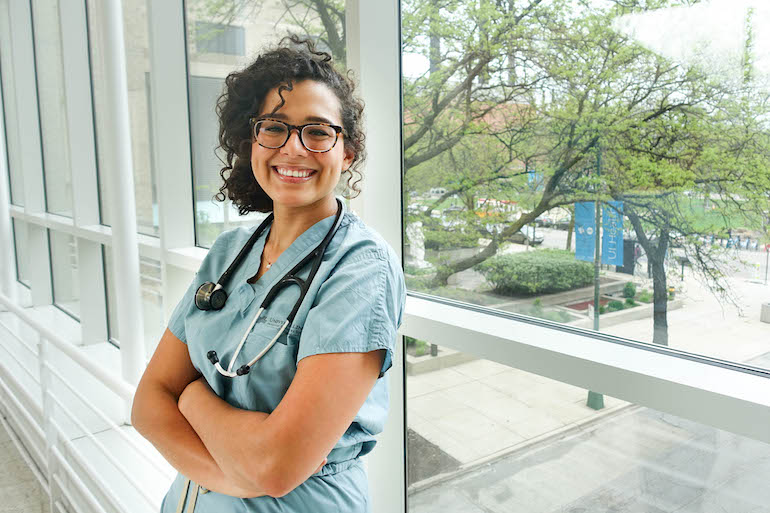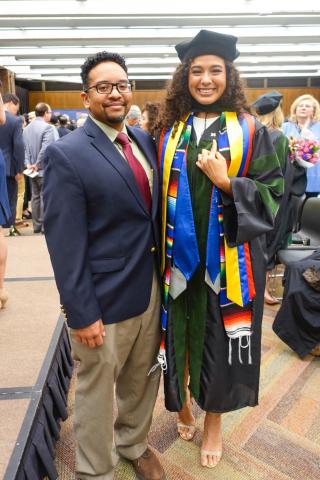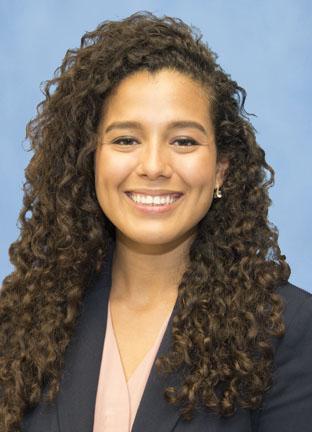
Ever since Valeria Valbuena could remember, she has always wanted to be a doctor. Growing up in a rural area of Colombia, she saw physicians as leaders in her community, taking an active role in politics and social justice. "It is a common Colombian saying that every family needs a doctor, a lawyer, and a priest" said Valbuena, now 26, “I just found myself to be better suited for the first.” Since the start of her career, she has longed to follow that model: advocating for her community as she pursued medicine. She was thrilled to be matched for her upcoming residency with the University of Michigan’s Surgery Department, not just for its stature as one of the top surgery residency programs in the country, but because of what Valbuena viewed as a steadfast commitment to inclusion and diversity. “Throughout the years, I have seen [Michigan] at every minority student conference actively recruiting and encouraging students from all levels of training,” she said. “Diversity in every front is being sought and welcomed at Michigan like nowhere else in the country.”
Valbuena’s family, originally based in New York City, moved back to Colombia when she was one year old. She could have attended medical school in Colombia, however, her mother pushed her to complete her studies in the U.S. where there is a more robust financial support system for students looking to pursue higher education.

She spent her undergraduate years in Florida and then headed to medical school at The University of Illinois at Chicago where she was drawn to general surgery. “I’m a very manual person. I love the idea of working with my hands.” Unlike other areas of medicine, surgery, she said, provides the opportunity “to physically repair what is damaged. There is a great deal of professional satisfaction in taking care of patients both at the bedside and in the operating room.”
Her mentor in medical school, Dr. Andrew Gonzalez, a current surgical chief resident at the University of Illinois and underrepresented minority physician, spoke highly about the University of Michigan after participating in the Health Services Research Fellowship at the Center for Healthcare Outcomes & Policy. So when the opportunity arose for a four week visiting clerkship sponsored by the Office for Health Equity and Inclusion (OHEI) at Michigan Medicine, Valbuena didn’t hesitate. She began the clerkship in August 2016, her fourth year of medical school. The program’s goal is to promote the development of medical students interested in health equity and inclusion work. “One of the things I have treasured the most about training at the University of Illinois is my patients. We pride ourselves on taking care of everybody. Our community is largely composed of patients of disadvantaged backgrounds. They are the people who need us the most. Serving them is what I’m hoping to do for the rest of my career,” she said.
Valbuena spent her time during the clerkship working in the Trauma-Burn Intensive Care Unit and was immediately impressed. “The patient care delivered at Michigan is outstanding,” she said. As the only student rotating in that service, she also appreciated that everyone – from the nurses to the residents and surgeons – made her feel part of the team.
Through the Health Equity Visiting Clerkship, she was paired with a mentor, Dr. David Machado-Aranda, a surgeon scientist with similar background and interests. Both he and Dr. Jill Cherry-Bukowiec, the Medical Director of the Trauma-Burn ICU, “were incredible role models” she said. Cherry-Bukowiec “has several appointments in the health system and medical school. She is very involved in medical student education, research, and has two little ones at home. Seeing her balance it all was very inspiring.” The time she spent with our Michigan faculty allowed Valbuena the chance to see how one might juggle an academic surgery career with parenting, teaching, and conducting research. “It was the first time I saw people doing all these things I wanted to do and doing them very well,” she said.
Initially, Valbuena didn’t see herself heading to a smaller city for residency. She sought the large metropolitan settings where the populations she is most interested in serving are more prevalent. “As physicians of color, we tend to flock to the cities more densely populated by minorities. One of our biggest impacts is to go back and care for our communities.” Other leading institutions often have less concrete goals and efforts when recruiting students of diverse backgrounds, she said. But Valbuena’s experience during her clerkship made it clear that Michigan leadership truly embraced and were fully dedicated to addressing the problem of increasing minorities in medicine. “They take a visiting clerkship to a new level,” she said. “I felt invested on and groomed for success during my four weeks here.” She was impressed by OHEI’s detailed and action oriented strategic plan to diversify the health care system. The director of OHEI, Dr. David Brown, is one of our minority Head and Neck surgeons and a champion for diversity in the health system and medical school, she said, “As an institution, it is very easy to say you’re welcoming to change and inclusion, but Michigan is putting in a significant effort and seeking participation from everybody,” she added.
Valbuena’s positive clerkship experience was one of the main reasons that Michigan was at the top of her list for her residency match. Another draw was chairman Michael Mulholland’s strong support for women and the program’s focus on the training of a balanced surgeon. Surgery in general “has a concerning track record of overworking trainees and making it difficult to pursue regular life milestones, like starting a family. As a woman, the field is often more intimidating than others,” but at Michigan, she said she found that residents are all genuinely happy. “The program is not only trying to ensure your academic success, but your personal one too.” She said that although most programs can provide a sound surgical training “what sets Michigan apart is their ability to have you stay whole through training and leave being able to provide the best care as the best surgeon and person you can be. The level of mentorship and dedication to residents is outstanding and something I really wanted to be a part of.”
She’s excited to join the rest of the General Surgery house staff this summer. One of her goals is to support OHEI’s efforts to recruit more minority physicians to the University. When she is a chief resident “I hope I get to look back at seven years of work and see that we are leading the way towards creating not only an excellent, but also diverse workforce in medicine.”
Valbuena aspires to be a chair of surgery and hopes that she’ll be a role model to other minority students. “I want to create pathways into surgery for students who have never seen themselves pursuing this career.” She’s eager to begin that journey in June at Michigan. She looks forward to be trained “at the place that is teaching, discovering, and mentoring like nobody else.”
By Julie Halpert
Photo credits: Alejandra Gallego
See Valeria Valbuena’s reaction on learning she matched up with her first choice The University of Michigan on Match Day at University of Illinois at Chicago this past March.
For more information on the Health Equity Visiting Clerkship, please contact the Office for Health Equity and Inclusion.


